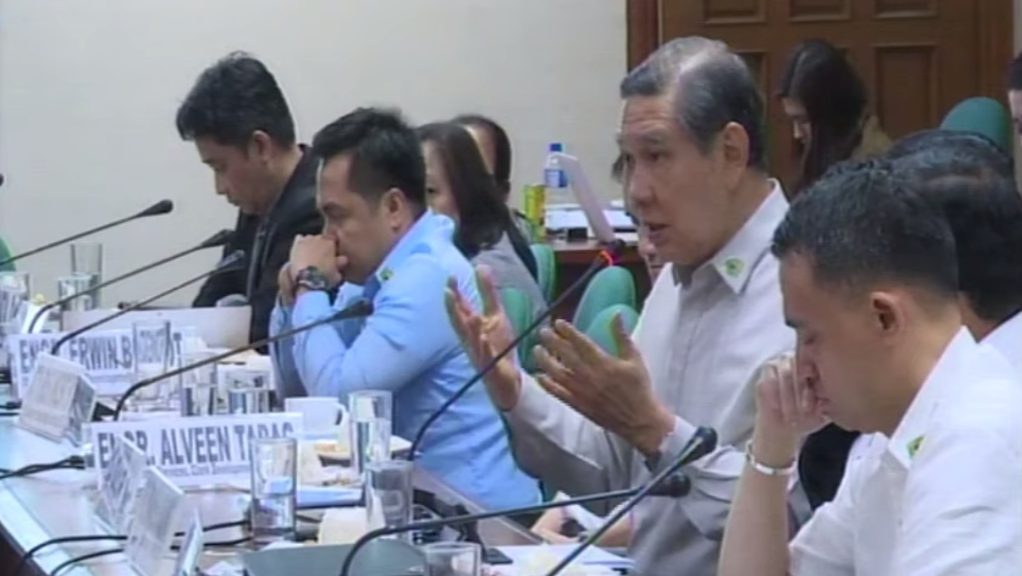SUMMARY
This is AI generated summarization, which may have errors. For context, always refer to the full article.

MANILA, Philippines – Former Metropolitan Waterworks and Sewerage System (MWSS) head Angel Lazaro III said the provisions of the controversial water concession agreement signed in 1997 were “not onerous” then because it was a “different time.”
“‘Yung onerous na sinasabi eh noong 1997, ibang-iba ho noon eh. Parang ‘yung tingin na onerous, noong 1997 iba ho. Kasi ang sama-sama ng sitwasyon eh,” said Lazaro, the MWSS chief when the deal was crafted and approved.
(What you’re referring to as onerous now, in 1997, that was a different time. If you think it’s onerous, in 1997 it’s not. Because the situation was very difficult.)
But several times during the hearing, Lazaro kept repeating that he, as an engineer, and the former MWSS board contracted the services of a group under World Bank because they “didn’t know better.”
He admitted that the consultant had gotten the side of the potential bidders, whose comments were in turn added to the draft deal. But he clarified that bidders were not privy to the final concession terms during the bidding. (READ: Risky Business: Why gov’t made sure Manila Water, Maynilad would earn)
“Di naman po kami nahihiya na aminin na hindi naman po kami marunong ng privatization dito sa Pilipinas. Kaya kami kumuha ng consultant na nagkonsulta sa lahat ng sectors,” Lazaro said.
(We are not ashamed to admit that we didn’t know anything about privatization in the Philippines. That’s why we got a consultant that did the consultation of all sectors.)
Then Lazaro added: “‘Di ko naman nabasa lahat [ng nasa agreement], dahil noon, noong 1996, hindi naman kami ganun karunong.” (I wasn’t able to read the entire agreement because before, in 1996, we weren’t that informed.)
Lazaro said the Ramos administration at that time created an inter-agency panel that scrutinized the draft water deal.
He said the Office of the Executive Secretary, the Department of Justice, the Presidential Legal Counsel, and the Office of the Government Corporate Counsel was part of the team, and even commissioned the services of ACCRA Law.
In response, Senator Ronald “Bato” dela Rosa said Lazaro shouldn’t wash his hands by saying that he “didn’t know better” because he was “just an engineer.”
“Hindi ‘nyo po pwedeng gawing excuse na ikaw ay isa lang engineer [at] hindi ka lawyer kaya nalusutan ka ng kung anu-anong onerous provisions dahil ikaw mismo ang pumirma sa kontrata,” Dela Rosa said.
(Your being an engineer and not a lawyer cannot be used as an excuse as to why several onerous provisions got past you, because you’re the one who signed the contract.)
Despite Lazaro’s insisting that the deal was not disadvantageous at that time, Bato said: “Iba na ngayon…Pero pareho pa rin na lugi ang gobyerno at lalong nasasadlak sa kahirapan ang ating bayan ‘pag ganyan ang ating paningin.”
(It’s different now but the situation’s still the same: That the government is still at the losing end and that our country is experiencing a more difficult time especially when our perspective is like that.)
Dela Rosa said that the former MWSS board should have been more prudent by conducting a background investigation of the consultant they hired back then.
Dela Rosa speculated that the consultants may have been connected with the winning bidders, in this case, Maynilad and Manila Water.
But Lazaro said the contractors had been chosen prior to his term so he couldn’t answer the question.
What happens beyond 2022?
In a media interview, Senator Grace Poe, the head of the Senate public services committee, said that the panel needs to know who were the ones behind the contract draft to know whether there is collusion.
Poe also said that she’s concerned about the sudden revocation of the water deal extension contract.
Under the botched extension deal, Pangilinan-led Maynilad and Ayala-owned Manila Water would have been the country’s water concessionaires until 2035, or an extension of 15 years.
“Pagdating ng 2022, kung hindi sila ma-extend beyond 2022, lahat ng project nila (concessionaires) in the pipeline matitigil. So dapat malaman natin for sure kelan matatapos ang either renegotiation,” Poe said.
(When 2020 comes, if the deal won’t be extended beyond 2020, all the projects in the pipeline will be stopped. So we need to know for sure when the renegotiations will end.)
At the hearing, the concessionaires did not disclose how much they might lose if the inevitable comes.
Maynilad and Manila Water made the headlines again when President Rodrigo Duterte threatened to scrap the 1997 concession agreement with them, as Singapore’s Permanent Court of Arbitration ruled in favor of Manila Water in its complaint that the government slashed unjustly slashed water tariffs, which led to losses.
After earning the President’s ire, both water firms vouched they would not charge the government a single cent from the arbitral win. – Rappler.com
Add a comment
How does this make you feel?
There are no comments yet. Add your comment to start the conversation.